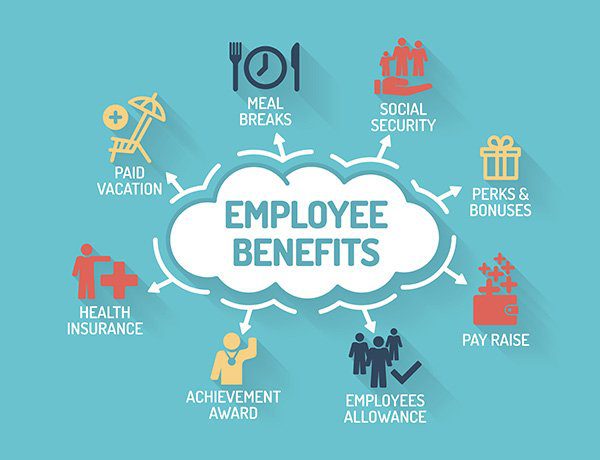With a historically low unemployment rate in the U.S. sitting just below 4 percent currently, we are now seeing that many employers across the country are struggling to fill their open positions, fighting one another to obtain and attain top talent. With competition being so strong, employers are offering decent pay and are starting to come around when it comes to offering an array of voluntary benefits based on the characteristics of their workforce.
Why are voluntary benefits important?
Voluntary benefits are extremely important to help people pick and choose the coverage they need based on varying life circumstances, current situations and down the road for those who plan ahead.
According to Colonial Life, voluntary benefits fall into four “life needs” categories:
- Health
- Wealth accumulation
- Security
- Personal

Now let’s go over why voluntary benefits are important, we’ll use a healthcare example because it’s such a polarizing subject in today’s America.
In 2016, the cost of care hit over $10,000 per person. With more-and-more employers turning to High-Deductible Healthcare plans (HDHP) to help offset the rising costs of healthcare and to keep premiums lower, we are seeing more people struggle to find the coverage they need as a result. To add to the fire, according to Heathcare.gov, “The IRS defines a high-deductible health plan as any plan with a deductible of at least $1,350 for an individual or $2,700 for a family.”
Oh, it gets better (actually worse)…
40 percent of American’s can’t cover a $400 emergency expense,” according to the Report on the Economic Well-Being of U.S. Households in 2017.
When people can’t afford something, they will typically throw it on a credit card or take out a loan. This puts even more stress on individuals or families who will ultimately have to pay more due to high-interest costs.
With this trend, employees are finding themselves in a stressful situation because they have gaps in their coverage that could potentially bankrupt them in the event of a medical emergency. This is where voluntary benefits come into play. Voluntary benefits help keep people and families protected in the event of unforeseen circumstances financially for the most part.
What employers need to know about voluntary benefits
A common misconception that many employers believe is that by offering voluntary benefits to their employees it will cost them big. However, the reality is that employers can offer these supplemental benefits at no direct cost to themselves.
Believe it or not, businesses do not have to be a giant corporation to offer these to their employees either. Some plans require an employer to hold a minimum of two to five employees on staff while some others have no minimum requirement whatsoever.
Now, let’s take a look at five of the more popular choices that are more in demand as both employers and the overall workforce become more educated on the pros and cons of voluntary benefits.
5 popular voluntary benefits that are trending in the workplace
1. Critical Illness Insurance
As we told you above, healthcare is very polarizing!
Critical Illness insurance, also known as Critical Care insurance or Critical Illness coverage, is meant to act as a deterrent to financial ruin if an employee suddenly becomes sick with a serious illness.

As a normal health insurance plan may cover some health care costs due to a sudden Critical Illness, it doesn’t cover the challenges of paying for the everyday living expenses a typical person has when they’re sidelined from working.
Critical Illness can hit anyone at any time. The benefits of offering Critical Illness insurance may just save your employees’ and/or their families from facing a large financial burden and uncertainty when times are at their toughest.
Critical Illness Insurance covers—heart attack, stroke, coronary artery bypass graft, renal failure, major organ transplant, loss of vision, loss of hearing, loss of speech, life-threatening cancer and more.
2. Student Loan Assistance
Americans owe over $1.48 TRILLION in student loan debt. A lot of this debt comes from the Millenial generation.
This voluntary benefit is becoming more in demand as Millennials become the majority in the workforce. This benefit allows an employee of a company to have a certain amount of money taken out of their check each pay period, and then their employer will either match some or all of it.
Every organization is different in how much they are willing to match. However, this benefit has a chance to be a gamechanger, especially for extremely talented individuals who are in crippling student loan debt. Currently, only 4 percent of all employers offer any kind of student loan benefit, but look for that number to rise over the coming years.
Related: The Critical Illness Insurance Market Continues to Trend Upward in the U.S.
3. Financial Wellness Planning
As mentioned above, student loan debt is huge for a lot of Americans and that’s not even taking into consideration the amount of credit card debt they are in too.
More organizations each year are beginning to find out that financial despair actually affects people daily, both at home and at work (who would have thought?). Financial planning and education is becoming more in-demand as people realize it’s harder to save for things today than 20 years ago. It’s still important for people to save for a house, save for children, their education, etc.
4. Pet Insurance
They are family for most people. Scruffy and Muffin… Who knew?
In the year 2017, the pet health insurance industry hit a new record for the number of pets insured in the U.S and Canada; 2 million, a 17 percent increase from 2016. According to Willis Towers Watson–who compiled the data for the NAPHIA report, “Pet health insurance is one of the most requested voluntary benefits and is expected to grow to 60 percent by the end of 2018.”
This rise is not surprising.

People love their pets and treat them as part of the family. When a loved one is sick or injured, you can expect that to be on the mind of the employee at work even when it’s their four-legged friend.
It’s a double-edged sword really. They are worried about their family member and they are also worried about the potential financial implications. Employers can offer this voluntary benefit to their employees to help keep their minds at ease in the event a furry friend needs medical help.
To learn more about pet health insurance, please read Pet Health Insurance is on the Rise in the U.S. and Canada.
5. Education and Training
Believe it or not, a lot of people are into self-improvement. With technology and the internet being as accessible and easy to use as it is today, improving yourself is a lot easier to do.
Smart organizations know that continuing education is essential in keeping their employees engaged, happy and enriched. This is a win-win for both parties because the employee gains new or refines their existing skillset which results in improvements to the organization too. Employers who offering training or continuing education see their employment churn rate lower than other organizations who offer little to no training.
Some popular, trending training includes coding, blockchain, leadership management, software classes, project management and much more.
Related reading for benefits brokers:
Your No Nonsense Guide to HSA Contribution Limits and More for Employers
The Brokers’ Guide to HR Automation Sales
5 Reasons Why Benefits Brokers Should Offer Critical Illness Insurance
The Arcoro platform offers benefits brokers the scalable solutions they are looking for most. The HCM platform includes the following modules:
- Benefits Management
- Applicant Tracking
- Payroll
- Employee Self-Service
- Performance Management
- Reporting
- Surveys
- Time and Attendance
- Time-Off Tracking
- Workflow Management
- EZSign (electronic signature)



